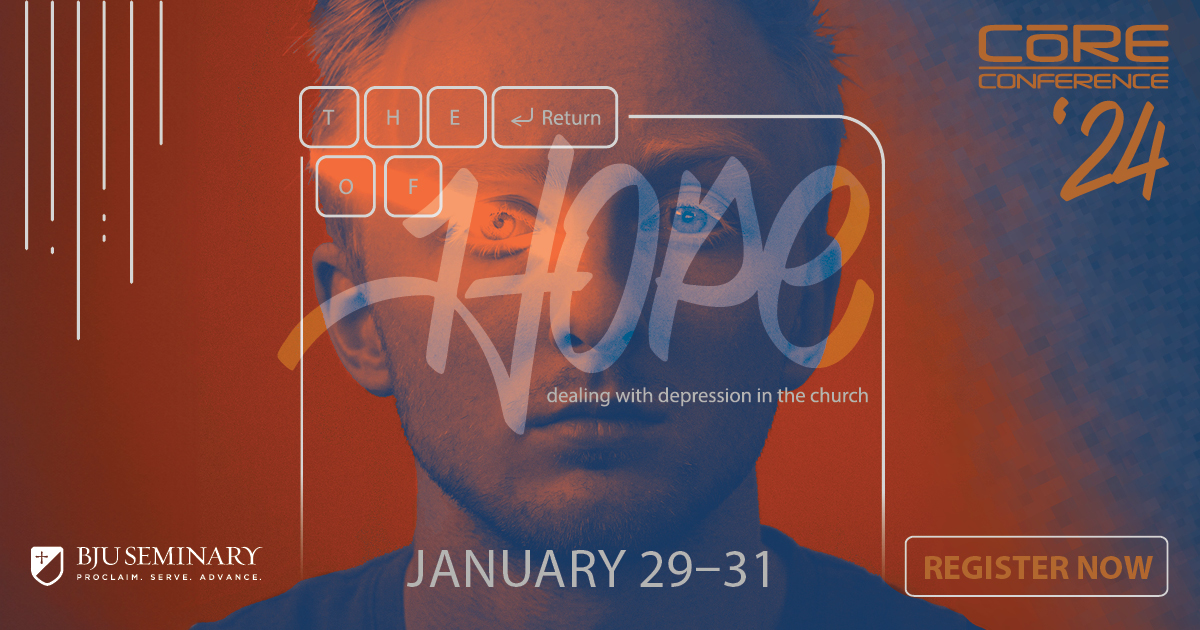Today’s post is sponsored by BJU Seminary and written by Bruce Meyer, biblical counseling faculty member. BJU Seminary equips Christian leaders through an educational and ministry experience that is biblically shaped, theologically rich, historically significant, and evangelistically robust.
What do we do with dark despair?
If you know anything about depression, you know that its seems to be a ubiquitous problem but also a controversial subject. How could it be that we misunderstand such a common problem? Because in this world, there are many common problems for which we have little understanding. Left to ourselves, we often interpret situations through a lens that is at best fuzzy and at worst extremely fractured. So what should we make of such a common problem that causes such severe grief in so many?
As we always should, let’s begin with what the Scriptures say about depression. Depending upon what translation a person uses, the word depression may not even appear in the Bible. Other words like sadness, despair, or grief, however, certainly establish that this emotion transcends time as much as the fallen human condition. Biblical authors, therefore, were neither ignorant of nor immune to heavy sadness that humans experience in daily living. Whatever term one chooses to use, there are countless passages that address this aspect of our fallenness. Even the Messiah was “a man of sorrows and acquainted with grief” (Isa. 53:3). We can trace these episodes of sorrow backwards to the Fall in Genesis 3, the beginning of all sorrows.
It should be an axiom of life that both the horrors of hell and the joys of heaven sometimes leak into this world in varying degrees. We long, however, for more joys and fewer horrors, a longing that keeps nudging our eyes toward our Father and heaven. How should we respond when we, as children of God, experience some of those horrors? Has God left us without hope, without solutions, without answers? As prevalent as sadness is in the Scriptures, so are God’s words of hope, beginning right after the Fall with a promised deliverer (Gen. 3:15). We should know also that our grief is merely a symptom of living in a broken world, but God’s hope overrules all despair. Hope in God is the operative concept.
God has provided His children with focused truth that gives comforting direction in moments of depression and despair. Lament psalms constitute the largest portion of the psalter—59 in all. These laments are complaints about the psalmists’ circumstances, including complaints about God’s seeming inattentiveness. Psalm 88 is the darkest of the laments, yet it offers the hope of deliverance through a God who saves: “O LORD, God of my salvation; I cry out day and night before you” (v. 1). Although the hope in this psalm is brief in contrast to the complaints, the psalmist is still expectantly engaging with God through his pleas for deliverance (v. 2). Did you see the hope again?
The most directly applicable psalms to despairing sadness are Psalms 42 and 43. The two psalms are linked through the common question, “Why are you cast down, O my soul?” (42:5) that the psalmist sprinkles throughout both passages. In each psalm the author not only describes his heavy sorrows, but also preaches hope to his own soul through the nature and work of God. There it is again—hope!
If none of these psalms provide the salve your heavy heart needs, then dig into the other 56 laments. These laments will direct your heart to the Savior-God who rescues us not only from sin, but from the shattering despair we encounter in this life. As we walk with him, we can experience a living hope in our living God that sooths the aching soul.
Join BJU Seminary January 29–31 for its CoRE Conference on “The Return of Hope: Dealing with Depression in the Church.” Save with the early bird discount until December 15!









